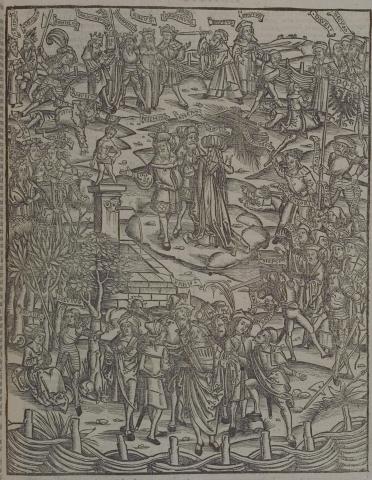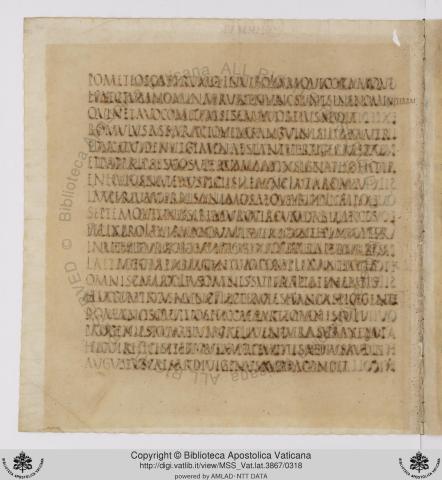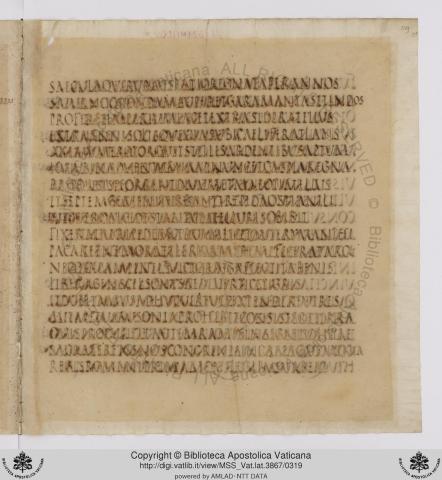Hūc geminās nunc flecte aciēs, hanc aspice gentem
Rōmānōsque tuōs. hīc Caesar et omnis Iǖlī
prōgeniēs magnum caelī ventūra sub axem.790
Hīc vir, hic est, tibi quem prōmittī saepius audīs,
Augustus Caesar, dīvī genus, aurea condet
saecula quī rūrsus Latiō rēgnāta per arva
Sāturnō quondam, super et Garamantas et Indōs
prōferet imperium; iacet extrā sīdera tellūs,795
extrā annī sōlisque viās, ubi caelifer Atlās
axem umerō torquet stellīs ārdentibus aptum.
Huius in adventum iam nunc et Caspia rēgna
respōnsīs horrent dīvum et Maeōtia tellūs,
et septemgeminī turbant trepida ōstia Nīlī.800
notes
Manuscripts: M | P | R 788-792, 793-800
Anchises points out the Julian family, and especially Augustus, the destined conquerer of realms wider than were ever traversed by Hercules or Bacchus (Conington).
788: geminās aciēs: = oculōs (Pharr): “both your eyes,” an expression in the “high style” and hence suited to Anchises’ prophetic enthusiasm (G-K). gentem: “family” (Bennett), the gēns Iūlia (Conington).
789: Rōmānōs tuōs: as being directly descended from you (Knapp); explanatory of hanc gentem (Bennett). Tuōs seems to be emphatic— Romans of your own stock (Conington). hīc: adverb (Comstock). Caesar: Julius (or possibly Augustus) (Pharr). Iūlī prōgeniēs: see 1.288: Iūlius, ā magnō dēmissum nōmen Iūlō (“Julius [Caesar], a name derived from the great Iulus”) (Knapp).
790: magnum caelī sub axem: “up to the vault / dome of heaven” (Knapp); “into the world above” (Bennett); “into the upper world,” i.e., into life (Carter). Caelī axem probably means, as Henry says, the rolling heaven or sky, the sky regarded as turning on its axis (Conington). But some refer it to Olympus itself, and the deification of the Caesars (Frieze). Iūlī: Iulus or Ascanius, son of Aeneas and Creusa (Carter).
791: saepius: “so often” (Comstock). hic: irregularly short in the second hic. This is the regular quantity in archaic Latin, but is rare in classical poetry (Bennett). quem…audīs: see, for example, 1.286: nāscētur pulchrā Troiānus orīgine Caesar (“the Trojan Caesar will be born of splendid origin”) (Knapp). These lines concerning the emperor Augustus are very famous (Carter).
792: Augustus: this title was bestowed upon Octavian by decree of the Senate in 27 B.C. (Frieze). Vergil here pays tribute to his great patron. According to one view of the Aeneid, which is more or less just, this name is the focus of the whole poem, that toward which all the rest points (H-M). dīvī genus: supply Caesaris, “son of him deified” (Bennettt); “son of the divine (Julius) Caesar” (F-B); “descendant of the god” (Carter); “son of the god,” i.e., of Julius Caesar, who after his death received divine honors and was called Dīvus (as were all emperors (Comstock)). So on coins Augustus Dīvī F(īlius) (Page). Augustus was the adopted son of Julius Caesar (Frieze).
792–794: aurea condet saecula quī…quondam: an unusual case of postponement of the relative pronoun; it throws great emphasis on the main idea (F-B): “who shall once more establish the Golden Age for Latium, amid the plough-lands where Saturn once held sway.” In the old national religion Saturnus (“the god of sowing”), the husband of Ops (“wealth”) (and predecessor of Jupiter (Carter)) is the type of prosperity and his reign was the golden age. It was in Latium that he ruled and disappeared (latēbat). Augustus is destined to restore this Golden Age (Frieze).
793: Latiō: supply in, ablative of place where (AG 421) (Pharr).
793-794: rēgnāta…Saturnō: the active rēgnāre, which is not properly transitive, is here felt to be so—and hence the perfect participle passive is used (Carter): “ruled over by Saturn” (Page). Saturnō is dative of agent (AG 375) (Bennett). per arva: Vergil seems to imply that the new Golden Age, like the first, shall be characterized by agricultural prosperity. It is well known that Augustus gave much attention to reviving farming, especially to the reestablishment of small farms, the number of which had been greatly reduced by the civil wars (Bennett).
794: super Garamantas: Greek form, 3rd declension (AG 81) (Comstock). The Garamantes were the most southern nation of Africa known, subdued by L. Cornelius Balbus in 19 B.C. (Page). The glory of Augustus is enhanced by representing him as having conquered nations beyond the farthest known (Conington). Alluding perhaps to the subjugation of the Ethiopians in 22 B.C. (Bennett). These people made overtures of peace to Augustus just before Vergil’s death; this allusion seems to be one of the last things introduced by Vergil into the Aeneid (Carter). Indōs: “the Indians,” i.e., Eastern races in general; the Romans had little to do with the Indī proper (F-B), and they were never subdued by Augustus. In 20 B.C., however, the Parthians restored to Augustus the standards captured from Crassus in 53 B.C., and an embassy came to Rome from India. Vergil may be exaggerating these incidents into a formal conquest of the remote East (Knapp). The meaning of verses 794–6 is, “beyond the Garamantes and Indians, and beyond the territory of Atlas” (Comstock).
795: tellūs: “the land” (beyond the Garamantes and Indians) (Chase), probably Ethiopia, overrun by C. Petronius in 22 B.C. (P-H); i.e., the land of the new dominions (Bennett). iacet extrā sīdera tellūs: “Earth (i.e., over which he shall extend his sway) lies beyond the stars” or “beyond the zodiac” (Chase). The land Augustus shall conquer beyond the Garamantes and the Indi is situated, according to the fancy of the poet, beyond the constellations (sīdera) south of the zodiac (Frieze), a poetic way of saying “beyond the Tropics” (Comstock). Sīdera (literally, “constellations”) designates first the constellations through which the sun passes in its annual course, i.e., the zodiac; then the part of the earth’s surface lying beneath this (Bennett).
796: annī sōlisque viās: “the path the sun follows in his yearly course.” Extrā sīdera…viās is really “beyond the world of civilization” (Knapp); this explains extrā sīdera (F-B). caelifer Atlās: Atlas is either a rebellious Titan condemned to support heaven, or Mt. Atlas in Mauretania, which is not unnaturally described as “heaven-supporting” (Page). Compare 4.247: Atlantis dūrī caelum quī vertice fulcit (“harsh Atlas who supports the sky on his summit / head” (G-K).
797: axem: the [vault of] heaven (Carter).
798: huius in adventum: “for (i.e., in expectation of) his coming” (Page); “at the prospect of his approach” (Chase); “in view of his coming”; join with horrent (Frieze). “Even now” (iam nunc), while Anchises is speaking, mysterious predictions heralding Augustus’ coming are perplexing the regions he will visit. The reference is to the emperor’s journey to the East (20 B.C.) for settling the provinces, which Vergil here represents as predicted long before, comparing it to the mythic travels of Hercules and Bacchus (P-H). Caspia regna: the regions of the Bactrians and Hyrcanians, who with the Parthians tried the power of Augustus (Frieze).
799: responsīs dīvum: dīvum = dīv(ōr)um; “by reason of divine oracles” (F-B). Responsīs is ablative of means (AG 410) (Conington) or ablative of cause (AG 404) with horrent (Frieze); i.e., oracles which are to be fulfilled by his coming (G-K). horrent: “shudder” at the prospect of his approach (Conington); “quake” (Comstock), “shiver,” used of the shivering fear caused by the oracles, but also suggesting skillfully the cold of the Caspian (Caspia rēgna) and the Crimea (Maeōtia tellūs). There is thus a contrast with trepida (800), which describes an excited state of fear, the hot haste of panic, and also suggests the warmth of Egypt (compare Georgics 1.296: trepidī aēnī, “a boiling caldron”) (Page). Maeotia: i.e., “Scythian” (Comstock); the region around the Sea of Azov (Carter).
800: septemgeminī: i.e., with seven mouths (Comstock); the Nile divides into a number of streams near its mouth, forming a delta (Pharr). trepida turbant: “tremble in terror” (F-B); “are all astir” (Knapp); “are troubled” (Frieze); “are in terror” (Comstock); “are in a panic” (Bennett). This intransitive use of turbō is very rare (Knapp).
vocabulary
flectō, flexī, flexus, 3, a. and n.: to bend; make by twisting, weave, 7.632; turn, guide, 1.156; rein, manage, 9.606; influence, sway, bend, move; retain, check, 12.46.
Rōmānus, ī, m.: a Roman, 1.234.
Caesar, aris, m.: a surname of the Julian gens, esp. Gaius Iulius Caesar, dictator and founder of the Roman Empire. His name was inherited by his nephew and adopted son Octavius and his successors; Augustus Caesar, 1.286; 6.792.
Iūlus, ī, m.: Iulus or Ascanius, son of Aeneas, 1.267, et freq.
prōgeniēs, ēī, f.: lineage, progeny, race, 1.19; offspring, 5.565; son, 7.97. (prōgignō)
veniō, vēnī, ventus: to come, freq.; come forth; approach, 6.755; rise, appear, 1.353; dawn, 10.241; to present one's self or itself, 5.344; descend, spring from, 5.373; impers., ventum est, we, they came or have come, 4.151.
axis, is, m.: an axle; synecdoche, car, chariot, 5.820; the axis of the heavens, the sky, the heavens, 4.482; the pole; the north pole, the north.
augustus, a, um: (adj.), venerable, 7.153; the surname given to Octavius Caesar by the senate, B.C. 27, and, after him, to the emperors generally, 6.792.
Latium, iī, n.: a country of ancient Italy, extending from the left bank of the lower Tiber to Campania, 1.6; (meton.), for Latīnī, the Latins, people of Latium, 10.365, et al. (2. latus; Virgil, 8.323, derives it from lateō)
Sāturnus, ī, m.: a deified king of Latium, whose reign was the “golden age"; identified by the Romans with the Greek Cronos, 8.319, et al.
Garamantes, um (acc. pl., -as), m.: the Garamantes, a barbarian tribe of Northern Africa, in the modern Fezzan, 6.794. (Γαράμαντες)
Indī: (adj.), belonging to India, Indian, 12.67; subst., Indus, ī, m., an Indian; pl., Indī, ōrum, the Indians, 7.605.
prōferō, tulī, lātus, ferre, irreg. a.: to carry forward or forth; extend, 6.795; postpone, delay, 12.395.
extrā, prep. w. acc.: outside of, beyond, 6.796; out of; from, 2.672. (exterā, abl. of exter)
caelifer, era, erum: adj. (caelum and ferō), heaven-bearing, sky-bearing, 6.796.
Atlās, antis, m.: Atlas, a king of Mauretania, famed for his knowledge of the stars, and hence said to have borne the heavens on his head and shoulders, transformed, according to mythology, by Perseus with the Gorgon’s head into the mountain that bears his name, 1.741, et al.
umerus, ī, m.: the upper bone of the arm; the shoulder, 1.501, and freq.
torqueō, torsī, tortus, 2, a.: to wind, turn, twist, 4.575; roll along, 6.551; whirl, hurl, 3.208; shoot, 5.497; cast, dash, 1.108; direct, 4.220; turn away, 6.547; turn, cause to revolve, 4.269; control, 12.180; p., tortus, a, um, whirled, whirling, impetuous, 7.567.
ārdēns, entis: burning, hot, sparkling, flaming, 5.637; bright, 4.482; impassioned, ardent, eager, 1.423; spirited, fiery, 1.472; glowing, lofty, 6.130; fierce, furious, 2.529; angry, 6.467. (ardeo)
adventus, ūs, m.: a coming, an arrival, 5.36; advance, 11.607. (advenio)
Caspius, a, um: (adj.), of the Caspian Sea, Caspian; Asiatic, 6.798.
respōnsum, ī, n.: an answer, reply, 2.376; oracular answer, response, 6.799. (respondeō)
horreō, 2, n. and a.: to bristle up or be bristling, 6.419; to bristle, 11.602; (fig.), to shudder, tremble, 2.12; shudder at, fear, dread, 4.209.
Maeōtius, a, um: adj. (Maeōtae), pertaining to the Maeotae, or Scythians on the Palus Maeotis, or Sea of Azof; Maeotian, 6.799.
septemgeminus, a, um: (adj.), sevenfold, said of the Nile on account of its seven mouths, 6.800.
trepidus, a, um: (adj.), agitated, uneasy, disturbed, trembling, affrighted, 2.380; excited, tumultuous, 11.300; confused, in disorder, 10.283; alarmed, fearful of, anxious for, w. gen., 12.589; panic-stricken, 12.583.
ōstium, iī, n.: a mouth; entrance, gate, door, 6.81; pl., ōstia, ōrum, harbor, port, 5.281; mouth of a river, 1.14. (1. ōs)
Nīlus, ī, m.: the Nile, 6.800.



